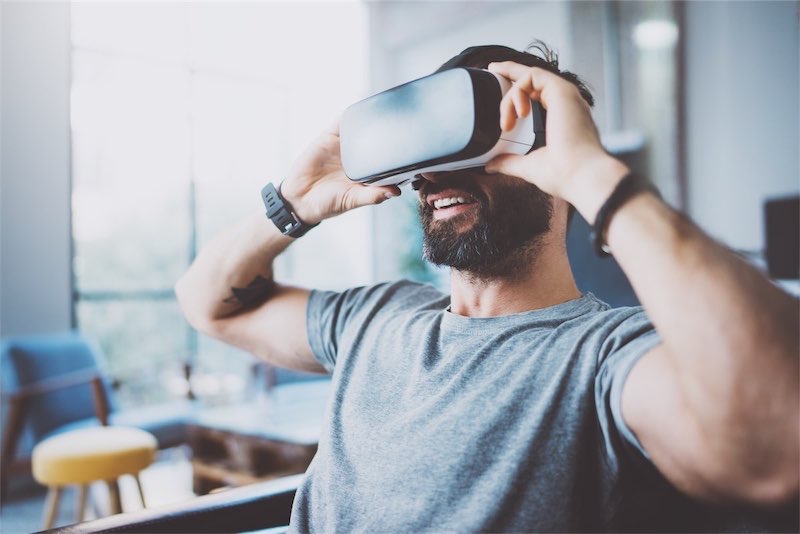As the global shutdown grows more distant in the rear view and we look at the road ahead, the fitness business faces this debate: is the virtual fitness world a real – and lasting – reality? With an influx of digital platform providers, the fitness industry has been flooded by technology companies who tell us “everyone” is talking about digital and VR (virtual reality) fitness, and that consumers are “demanding” more and more digital fitness experiences.
But are they? Are we destined to work out alone, in VR goggles? Maybe looking to other industries could shed some light on the fitness road ahead.
In discussions I have had with colleagues and customers about the future of fitness, they often draw a parallel to the WFH (Work from Home) movement and companies that have shifted to have employees to office from home. Remote work, possibly like fitness, provides more flexibility, more autonomy (for better or for worse), and with the right technology of Zoom, Teams, Slack and Chat, people can still ‘connect and collaborate’ just like the old days… or so the theory goes.
However, this comparison has some serious flaws, namely that most people have to work. Working out is more elective. A better comparison for the health club industry is to look at others in the service industry, like airlines. People want (or need) to travel, so they gather at airports, in terminals, in restaurants and in the plane itself. And many people are anxious about flying, but endure it to get where they want to go. What if the airline could alleviate some of the struggle and stress and deliver the same type of return and reward?
Imagine this: Delta Airlines’ new VFH (Vacation from Home) model, one that allows guests to, “enjoy the experience of travel virtually anytime, anywhere.” It’s a concept that will open the virtual doors of the world to make travel accessible to anyone with an internet connection and a VR headset. The theory is that with more people working from home and more people less inclined to gather in groups, people can experience and explore the world without the hassle of changing planes or time zones. No bags to pack. No airport security to endure. No currency to exchange. No crowds and no customs. The joy of travel without the troubles of flying. Virtual travel, travel without leaving home, all for a slightly lower price than an actual, live trip.
Does this all sound a little too outrageous? Like a too-strange-to-be-true April Fool’s joke? That’s because it is. Happy belated April Fool’s Day. I made it all up. Sorry to ruin your screen-cation hopes and dreams.
My point is this: The role of digital fitness and VR workouts has dominated the conversation of the industry over the past few years, including – to some extent – here at MOSSA, where we broadly launched MOSSA On Demand in March of 2020 to keep people connected and moving when their facilities abruptly closed. It’s not VR fitness; it’s a varied and expansive library of workouts and recoveries that are filmed to give people the feeling of a live class, of “being there.”
And what we’ve learned, running both live workouts and digital workouts filmed with a live feel, is that there’s absolutely a place for digital options, but people will always need the live, connected, energized, social experience. After all, fitness has been available by video for 40-plus years (and on demand for more than 10). Since 1982, people have been able to work out at home with a VHS tape and a TV. But, millions still chose to join a health club for the social experience. Today is no different, aside from the higher-def, better fashion, and convenience of streaming. People can enjoy a digital option, but after pandemic-induced Zoom meetings and Facetime family gatherings, we believe that the future isn’t more screen-time; it’s some screen time and more social time.
We predict – we hope – that whenever and wherever possible, people will seek out live workouts to reconnect with people and shake off digital fatigue. Because there’s no experience, behind a screen or goggles, that can replace it.
And when that’s impractical, streaming options can fill in the gaps, or even ease someone into the live experience after gaining confidence at home.
It’s not so unlike travel in that way; more people started traveling as soon as things began to reopen, maybe inspired by something they saw online. Or maybe they were just itching to leave home, be with other people, and share in an experience. Whatever the case, we know online travel inspirations or anything in the Metaverse, will never replace a real trip. But it could inspire someone to take the first step on their journey.
People travel for some of the same reasons they work out… because the results are worth the effort. For some, it’s a sense of adventure and accomplishment; for some, it’s a way to escape, destress and relax; some want to meet new people; and, for others, it’s as simple as having dedicated time to reset and regroup. Like traveling, inspiration for exercise can absolutely come from a screen, a digital experience, (dare we say, possibly) a pair of goggles. And, also like traveling, a memorable, high-quality, live, social, group bonding experience can’t and won’t ever be replaced by a screen.
• • •
If you are looking for ways to reengage your members, reenergize your team and reboot and relaunch a high-quality member experience, we’d love to talk. Learn more here.



 New Member Onboarding: Over-Welcoming or Overwhelming?
New Member Onboarding: Over-Welcoming or Overwhelming? Team vs. Technology and the Future of Fitness
Team vs. Technology and the Future of Fitness Setting Goals for Group Fitness
Setting Goals for Group Fitness Does Exercise Have to be Boring and Bitter?
Does Exercise Have to be Boring and Bitter? Do you Have Exerciser Imposter Syndrome?
Do you Have Exerciser Imposter Syndrome?